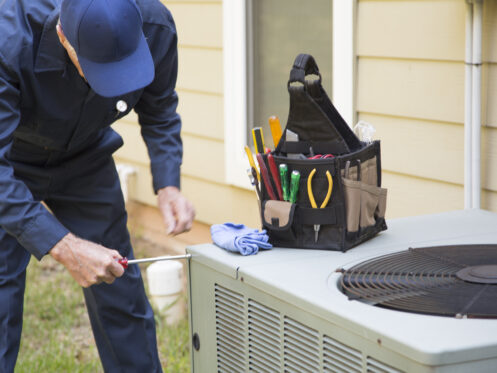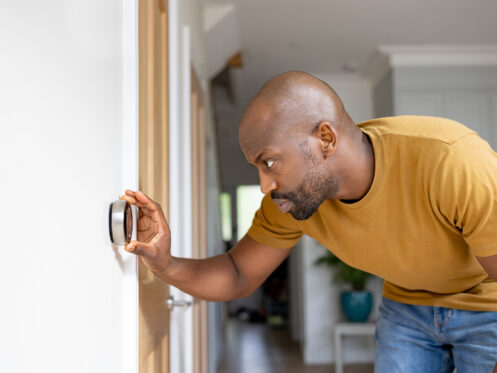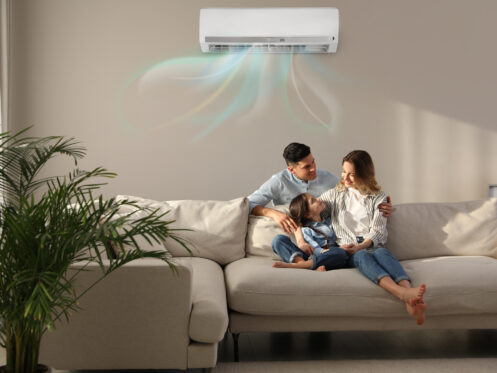Ensuring that your home stays at a comfortable temperature throughout the year is obviously important. However, Florida’s hot, humid tropical climate can make this much more difficult here than it is in other parts of the country. This is especially true when it comes to keeping your home cool during the summer. Still, Florida’s climate can also impact how you heat your home. With this in mind, let’s look at the Florida seasons and what they mean for your home’s heating and cooling systems.
Options for Heating Your Florida Home
As you’d expect, Florida’s climate plays a much bigger role in cooling than it does in heating. With average low temperatures rarely dropping below the mid-40s even in the middle of the winter, spending money on a central heating system generally doesn’t make much sense. Nonetheless, there will still typically be at least a few days of the year when you’ll be glad that your home has some source of heating.
Generally speaking, a heat pump is by far the best heating option for people living in Florida or any other place that experiences warm, fairly mild winters. Compared to gas or electric furnaces, heat pumps are far more efficient and use much less energy. The other advantage of heat pumps is that the same unit can be used to provide both heating and cooling. This means that you can save a huge amount on purchase and installation costs by opting for a heat pump instead of a separate furnace and air conditioner.
Comparing the efficiency of gas furnaces to heat pumps is a bit complicated since one runs on gas and the other solely on electricity. Still, it can be done by looking at what percentage of the energy it consumes is turned into heat. When the outdoor temperature is above freezing, even a decent heat pump will usually produce at least twice as much heat compared to the amount of energy it consumes. Even the best gas furnace on the market, on the other hand, will have a maximum efficiency rating of around 95%.
This means that for every unit of energy, it consumes, 95% of it is converted into heat. For a heat pump, this number is usually anywhere from 200% to 300% as long as the outside temperature remains fairly mild. Even if the weather does drop below freezing, a heat pump will generally always be more efficient than a furnace. The only exception is when the temperature starts getting down closer to 0 degrees Fahrenheit.
The Impact of Florida’s Hot, Humid Weather on Your AC
Considering that temperatures can rise well above 70 degrees Fahrenheit even during the winter, it’s not surprising that many Florida homeowners end up using their air conditioners throughout most of the year. The average American runs their air conditioner for just over 1,000 hours per year. However, this assumes that you only run your AC for 12 hours a day three months out of the year, which obviously isn’t the case when you live in a hot climate. For people in Florida, it is not uncommon to have the AC run for 2,000 to 3,000 hours a year or more.
All of this extra use obviously increases the wear and tear on your air conditioner and can result in increased repairs and a much shorter lifespan. Making sure to have your cooling system professionally maintained at least once a year can help to lessen these issues. Nonetheless, all of that added use will still catch up with the unit eventually.
Another issue is that your air conditioner will have to work much harder to keep the home cool when the temperature outside or the humidity level inside the house is higher. High humidity can be especially problematic since the AC has to remove the excess humidity in order to cool the air. The more humid the air is, the warmer it also is. This results in your AC needing to run more frequently and for longer periods, which leads to both increased wear and tear on your cooling system and greater energy usage.
Overcoming Issues With High Humidity
It can be extremely difficult for your air conditioner to keep up and properly cool the house on especially hot, humid days. This often results in insufficient or uneven cooling in addition to increased energy costs. One of the easiest ways to avoid this problem is by keeping your home shut up tight during the most humid times of the year to prevent all of that excess humidity from getting inside the house.
If the humidity level inside the home rises too high, the excess moisture will actually soak into your furnishings and walls and make it far more difficult for the AC to do its job properly. This is precisely why HVAC experts recommend that you never sleep with your windows open during the summer if you live in a humid area. Studies have shown that opening your windows at night can potentially increase the amount of energy your AC uses during the day by more than 20% as it struggles to overcome the excess humidity inside the home. As a result, this will usually offset whatever energy you saved by not running the air conditioner during the night.
Unfortunately, even keeping the home closed up tight during the wettest parts of the year often isn’t enough to fully overcome the issues caused by high humidity. For this reason, you may want to consider installing a whole-home dehumidifier if your home suffers from humidity issues. These units work in conjunction with your home’s HVAC system to remove excess moisture from the air. In turn, this allows your air conditioner to function far more efficiently as it won’t have to struggle to cool the humid air. This will obviously result in lower costs to cool your home. As well, it will decrease the wear and tear on your system, potentially lessen the need for repairs, and extend the lifespan of your air conditioner.
Depending on the setup of your existing HVAC system, a whole-house dehumidifier will usually cost anywhere from $1,500 to $6,000 to purchase and install. While this may seem like a lot of money on the face of things, the fact is that the system will usually pay for itself in time by allowing your AC to run less often. Even using your air conditioner for one less hour a day can potentially reduce your monthly cooling costs by $100 or more depending on the size of your AC unit.
The fact that drier air feels cooler than humid air also means that, with a dehumidifier, you may be able to set your home’s thermostat to a few degrees warmer than you normally would if your home was overly humid. This can result in even greater savings and less stress on your AC system.
Florida’s Heating and Cooling Experts
If you have any questions about your home’s HVAC system or need any repairs, maintenance, or installation, Buehler Air Conditioning & Plumbing is here to help. We are a Carrier-authorized dealer and offer a range of energy-efficient air conditioners, heat pumps, and other heating and cooling equipment. Our team of NATE-certified technicians can also repair and maintain all brands, makes, and models. We are located in Jacksonville, Florida and serve customers throughout Duval County.
Give us a call today to schedule an appointment or consultation and see what we can do for you.




